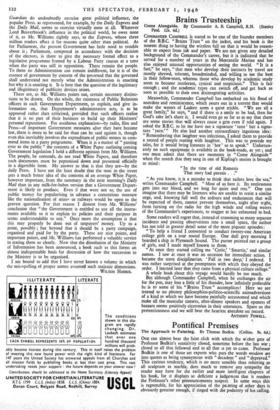Brains Trusteeship
Come Alongside. By Commander A. B. Campbell, R.N. (Stanley Paul. 12s. 6d.) COMMANDER CAMPBELL is stated to be one of the founder members of the B.B.C. "Brains Trust " on the jacket, and his book is the nearest thing to having the wireless full on that it would be reason- able to expect from ink and paper. We are not given any detailed background of the Commander's career, but it is indicated that he served for a number of years in the Mercantile Marine and has also enjoyed unusual opportunities of seeing the world. " It is a fact," he says, " that men who develop their instincts by travel are mostly shrewd, tolerant, broadminded, and willing to see the best in their fellow-men, whereas those who develop by academic study seem to become intolerant, cynical and suspicious." This is fair enough ; and the academic types can switch off, and get back as soon as possible to their own disintegrating activities.
Meanwhile, Commander Campbell has embarked on his flood of anecdote and reminiscence, which pours out in a torrent that would make the waters of Lodore seem a quiet trickle. " We are all a great family," he says, " and if there is a smile to be had, then for God's sake let's share it. I would even go so far as to say that there are some stories that will always cause a grin even if told again. I asked the B.B.C. to let me have not a signature ' tune ' but a signa- ture ' yarn.' " He also had another extraordinary ingenious idea: " Remembering that laughter was infectious, I asked them to provide a record of people roaring with laughter. This was to precede my tales, for it would bring listeners in ' hot' so to speak." Unfortun- ately no such equipment is available in the book-trade, as yet ; and one must admit that there are moments in " Come Alongside " when the snatch that they sang in one of Kipling% stories is brought to mind: " In the time of old Ramesis That story had paresis . ."
" As you know, it is a mistake to think that sailors love the sea," writes Commander Campbell. " Most of us hate it. Its restlessness gets into our blood, and we long for quiet and rest." One can imagine that there may be listeners who are unable to resist a similar urge, and, knowing full well the ardours and endurances that will be expected of them, cannot prevent themselves, night after night, from turning on the radio for the high winds and rolling waters of the Commander's experiences, to stagger at last exhausted to bed.
Some readers will regret that, instead of cramming so many separate incidents and passing observations into a small space, the author has not told in greater detail some of the more piquant episodes: " To help a friend I consented to conduct twenty-one American college girls on a tour round Europe. One dull grey morning I boarded a ship in Plymouth Sound. The purser pointed out a group of girls, and I made myself known to them.
" At once they started calling me Cutie," Smartie,' and similar names. I saw at once it was an occasion for immediate action. I became the stern disciplinarian. ' Fall in two deep,' I ordered. I was rather surprised at the promptness with which they obeyed the order. I learned later that they came from a physical culture college."
A whole book about this voyage would hardly be too much. But although Commander Campbell, when he exchanges the air for the pen, may lose a little of his thunder, how infinitely preferable he is to some of his "Brains Trust " accomplices! Here we are treated to no phoney philosophico-politico-scientific animadversions of a kind to which we have become painfully accustomed and which make all the muscular curates, after-dinner speakers and openers of bazaars seems positively ciceronian in their utterances. Spare us the pretentiousness and we will bear the hoariest anecdote on record.
ANTHONY POWELL.


























 Previous page
Previous page